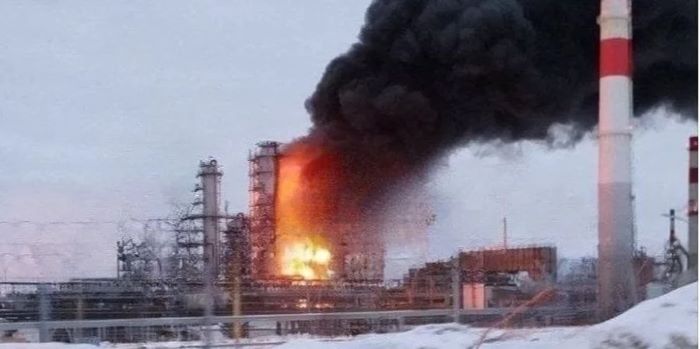It’s important not to overestimate Russia’s ability to produce fuel, despite its vast oil production. At least 10 of the 32 major oil refineries have been targeted by drones. Explosions have disrupted or partially disrupted the work of these workers.
Ukrainian drones have reduced Russia’s vital income from fuel exports by targeting critical oil refineries, storage facilities and deep within Russian territory. Experts believe that intensifying the attacks could lead to severe fuel shortages and hinder Russia’s ability sustain military operations.
First results of the campaign
In 2023, Ukraine began its campaign of long-range attacks against Russian oil refineries. In 2024, the campaign was intensified. Since the start of the year, ten large refineries were damaged. Some of them have been struck several times. The number of major oil refining facilities in Russia is 32. There are also dozens of smaller refineries. Russia has already banned petroleum exports for a half-year starting 1 March 2024 to cover its domestic needs.
At the beginning of spring sowing, the timing of attacks is right. Fuel demand is increasing rapidly in the agricultural sector of Russia. Last year, Russia faced a fuel shortage during the August harvest. This forced the government to reduce fuel exports.
Ukraine is targeting fuel depots in the areas surrounding the frontline troops of Russia to create a fuel shortage. Fuel from the westernmost Russian refineries that were first hit, is sent to Ukraine where it is used to refuel enemy tanks, combat vehicles, and aircraft. The strikes also hurt the Russian economy, which makes it harder for the occupiers to manufacture weapons, finance their army, and launch missiles at Ukraine.
Russia produces over 530 million tonnes of oil per annum, of which 280 millions tons are processed in-country by the Russians. It would be a very painful experience for Russia to destroy these refining capacity, as it would force them to import more expensive fuel or export more oil at lower prices. In the first quarter 2024, Ukrainian attacks have already halted over 7% (of Russia’s) refining capacity. In response to refinery failures, Russia will increase its oil exports via Western ports by nearly 200,000 barrels per daily.
In Russia, diesel and petrol prices are on the rise. If the Ukrainian refinery strikes continue, Russia will be forced into adopting even more export restrictions. It has already begun negotiations with Belarus about the increase in fuel imported.
Did the US ask Ukraine not to launch drone attacks against Russian refineries?
The Financial Times reported on 22 March 2024 that the US warned Ukraine not to continue drone strikes against Russia’s oil refineries. They cited concerns over rising oil prices and potential retaliation. The warnings were apparently sent to senior officials of Ukraine’s security services.
The US allegedly warned senior officials in Ukraine’s State Security Service and Military Intelligence Directorate that drone strikes could drive up global oil prices, provoking retaliation. Both agencies were responsible for the expansion of drone programs that target Russian assets on land. The US was also concerned that Russia would retaliate against the West by destroying the energy infrastructure they depended on, such as CPC pipelines carrying Kazakh oil into global markets.
It is difficult to verify if these warnings were actually given, but Ukraine denied receiving any warnings. They were also urged to stop attacks on Russian oil refineries. Mykhailo Podoliak, Ukrainian President’s advisor, denied FT report. He dismissed it as “fake news” and asserted Ukraine’s right under international law to target aggressors war capabilities. Podoliak stressed that Ukraine would not accept dictations on how to conduct war after two years since the full-scale invasion.
Olha Stefanishyna has stated that the Ukrainian military is entitled to target oil refineries in Russia. She said that Ukraine was acting in accordance to NATO standards at the Kyiv security forum.
Ukraine launched a drone strike a day after the FT report. The drone attack reportedly damaged the primary oil refining columns, which are crucial to the refinery. The action shows that either the US did not express any concerns about the strikes, or that Ukraine refused to obey them.
Can these strikes increase oil prices?
Ukraine has targeted mainly oil refineries and not oil production or pipelines. This means that the strikes do not affect Russian crude exports. Russia will also be forced to export more crude oil due to its decreasing ability to refine oil. This will drive down prices.
Oil prices could change if Ukraine also begins to attack oil export facilities. This step would be more painful for Russia. It is reasonable to assume that Ukraine will begin to hit crude oil exports in order to disrupt Russia’s financial ability to finance the conflict, especially since the West has not adhered to its own sanctions, including the EU embargo against Russian oil.
According to Mykhailo Gónchar, Ukraine’s energy specialist and President of Centre for Global Studies “Strategy XXI”, the arguments in FT are absurd, because Ukrainian drones didn’t hit oil extraction sites on Siberia.
Read More @ euromaidanpress.com













